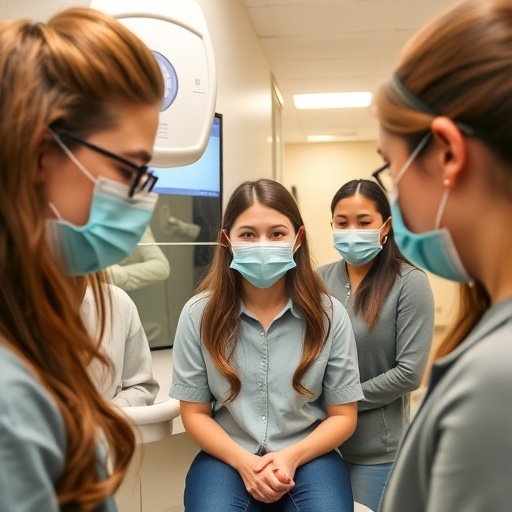A comprehensive new study carried out at George Mason University reveals a compelling link between students’ dental care habits and their broader approach to health maintenance. This research highlights that undergraduates who consistently attend dental exams are also more likely to engage in other preventive healthcare activities, including scheduling eye and physical examinations, maintaining health insurance, and fostering a positive self-assessment of overall health. These findings, derived from a detailed analysis of longitudinal data, emphasize the role of dental care as a gateway into a wider preventive healthcare landscape.
Dental care, often regarded as an isolated aspect of health, appears in this study to be a pivotal indicator of an individual’s holistic health behavior. Conducted by Vanessa Alvarez, a second-year Master of Public Health Epidemiology student, alongside Lawrence Cheskin, a distinguished nutrition professor and obesity researcher, the research elucidates the interconnected nature of preventive health practices among university students. Their work forms a subset of the expansive “Mason: Health Starts Here” cohort, a landmark longitudinal study tracking the health trajectories of undergraduates at George Mason.
Alvarez and Cheskin’s investigation draws on data from 349 first-year students within the cohort, providing a robust platform for examining trends in healthcare usage before and after the onset of the COVID-19 pandemic. A critical discovery from this data is the persistence of dental care habits; students who had undergone dental exams prior to college were significantly more likely to continue these regular visits two years into their academic journey. This continuity suggests that early-established health routines are foundational for future healthcare engagement.
Another salient aspect of the research points to the influence of health insurance on access to dental care. The data demonstrates that students holding health insurance were more prone to regular dental visits, underpinning the role of insurance in facilitating preventive healthcare. Additionally, an intriguing cross-sectional relationship was observed: students who attended any form of preventive exam, whether dental, vision, or physical, exhibited a higher likelihood of pursuing multiple preventive services, reflecting an integrated health-seeking behavior rather than fragmented care.
Moreover, the study probes deeper into psychosocial dimensions influencing health behaviors. Students benefiting from greater parental financial support showed increased dental care adherence, linking socioeconomic factors to health maintenance. Similarly, higher levels of personal hope correlated with more positive overall health ratings, positioning psychological well-being as a crucial determinant of health perception and behavior.
The pandemic’s complex influence on dental care utilization was a key focus in the study’s timeline comparison. Contrary to broader concerns regarding healthcare access disruptions during COVID-19, rates of dental examinations among the cohort remained strikingly stable from before to after the pandemic’s emergence. This resilience could be interpreted as an indicator of sustained health prioritization amidst unprecedented challenges.
A nuanced relationship between anxiety and preventive healthcare emerged from the data, illustrating the intricate interplay between mental health and health-seeking behavior. Students with mild anxiety tended to be more proactive in seeking dental care, potentially motivated by heightened health awareness or concern. Conversely, individuals experiencing higher levels of anxiety were more likely to avoid preventive examinations, suggesting that excessive anxiety may act as a barrier rather than an incentive for healthcare engagement.
This study’s insights contribute a valuable perspective to the broader understanding of how young adults navigate healthcare during formative years, especially under the shadow of a global pandemic. It underscores the importance of fostering early preventive care habits that can cascade into sustained health management practices, ultimately shaping long-term health trajectories.
The dental care findings are embedded within the broader “Mason: Health Starts Here” initiative, a novel longitudinal study commencing in 2019 designed to capture the evolving health and lifestyle patterns of more than a thousand undergraduate students. This extensive research platform collects comprehensive data spanning dietary habits, physical activity, sleep quality, mental health status, and substance use, among other factors, engendering a holistic view of student health.
Previous results from this cohort have already illuminated critical public health challenges, including the detrimental effects of discrimination on eating disorders and the impact of loneliness on dietary choices and physical activity levels. Additionally, the research has delved into the intersectionality between firearm access and substance use, providing a multifaceted understanding of risk factors prevalent in college populations.
Building upon the foundational dental research, ongoing studies within the cohort are expanding to other healthcare domains. Alvarez is currently leading an investigation focusing on eye care utilization among students, while other research projects explore gynecological health in female undergraduates. Future work spearheaded by Cheskin aims to evaluate shifts in diet and exercise patterns precipitated by the pandemic and to monitor mental health trends such as depression and hopefulness.
By integrating preventive services such as dental, vision, and physical exams, the research advocates for a model of primary care that transcends singular health concerns and fosters a more comprehensive, integrative approach to student wellbeing. These findings serve as a call to action for university health systems and policymakers to prioritize accessible, multidisciplinary preventive care infrastructures that support young adults during critical developmental phases.
The complex relationship between mental health and healthcare engagement identified in this study further accentuates the necessity for tailored interventions. Mental health support services that address anxiety at varied severity levels could potentially mitigate barriers to preventative care, enhancing overall health outcomes for students.
In sum, this research underscores dental care as more than an isolated health behavior but rather as an integral component of a broader preventive health strategy embraced by undergraduates. By elucidating the patterns and predictors of dental care in relation to other health services and psychosocial factors, the study opens avenues for targeted health promotion initiatives aimed at fostering lifelong wellbeing.
Subject of Research: People
Article Title: Predictors of Dental Care Services Before and After the onset of the Covid-19 Pandemic among undergraduates at a U.S. University
News Publication Date: 28-Jul-2025
Web References:
References:
- Discrimination and disordered eating: https://pubmed.ncbi.nlm.nih.gov/36850009/
- Firearm access and substance use: https://pubmed.ncbi.nlm.nih.gov/36395040/
Keywords: Dental care, Public health, Nutrition




